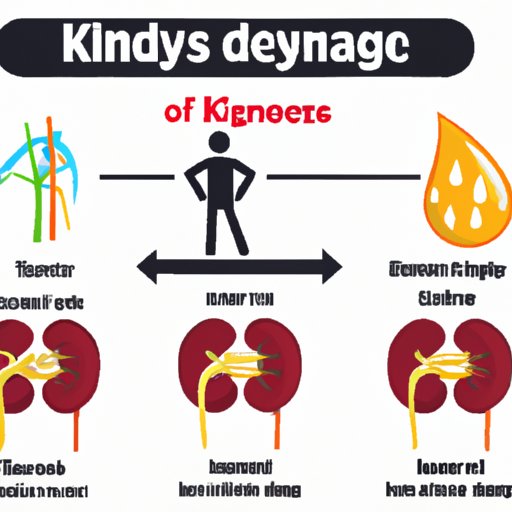
I. Introduction
Kidney disease is a serious condition that affects millions of people worldwide. One of its most advanced stages is stage 3, where the kidneys begin to lose their ability to function properly. In this article, we will discuss the causes and risk factors of stage 3 kidney disease, as well as how to recognize its symptoms and take steps to manage the disease.
II. Cause and Effect: A Detailed Overview of the Factors Leading to Stage 3 Kidney Disease
Stage 3 kidney disease occurs when the kidneys are functioning at 30 to 59 percent of their normal capacity. This can be caused by a variety of factors, including:
- Chronic high blood pressure
- Diabetes mellitus
- Autoimmune disorders
- Polycystic kidney disease
- Systemic lupus erythematosus
- Vascular diseases
These factors can cause damage to the kidneys over time, eventually leading to the decreased functioning seen in stage 3 kidney disease. If left untreated or undiagnosed, kidney disease can result in a number of long-term effects, including:
- Kidney failure
- Heart disease
- Stroke
- Nerve damage
- Fluid buildup in the lungs
- Death
III. The Silent Aggressor: Uncovering the Main Culprits Behind Stage 3 Kidney Disease
Kidney disease can progress silently without showing any symptoms, making early diagnosis difficult. However, there are a few signs and symptoms that could indicate the presence of kidney disease, including:
- Frequent urination
- Blood in the urine
- Foamy urine
- Swelling in the legs, ankles, or feet
- Feeling tired or fatigued
- Nausea or vomiting
The main causes of stage 3 kidney disease are often related to medical conditions such as high blood pressure and diabetes. High blood pressure, also known as hypertension, damages blood vessels in the kidneys, making it harder for them to filter waste products from the body. Similarly, diabetes can cause damage to the kidneys over time due to high levels of sugar in the blood. Other causes of kidney disease may include autoimmune disorders, infections, and genetic factors.
IV. Lifestyle Choices That Put You at Risk of Developing Stage 3 Kidney Disease
Lifestyle choices can also play a role in the development of kidney disease. Specific lifestyle factors that increase the risk of developing stage 3 kidney disease include:
- Poor nutrition
- Sedentary lifestyle
- Excessive alcohol consumption
- Smoking
- Drug abuse
If you are concerned about your risk of kidney disease, there are several steps you can take to reduce your risk. This includes eating a healthy diet rich in fruits, vegetables, and whole grains, exercising regularly, and avoiding smoking and excessive alcohol consumption. Additionally, if you are at risk for kidney disease, it’s important to get regular check-ups with your doctor and monitor your blood pressure and blood sugar levels.
V. From High Blood Pressure to Diabetes: Examining the Medical Conditions That Contribute to Stage 3 Kidney Disease
Medical conditions such as high blood pressure and diabetes are major contributors to the development of kidney disease. High blood pressure damages blood vessels in the kidneys, making it harder for them to filter waste products from the body. Over time, this can lead to decreased kidney function and eventually kidney disease. Similarly, diabetes can cause damage to the kidneys over time due to high levels of sugar in the blood. Other medical conditions that may contribute to kidney disease include autoimmune disorders, infections, and genetic factors.
VI. Genetics and the Body: Understanding the Role of Inherited and Biological Factors in Stage 3 Kidney Disease
Genetics and biology can also play a role in the development of kidney disease. Some people may be genetically predisposed to developing kidney disease due to a family history of the condition. Additionally, certain biological factors can contribute to the development of kidney disease, including:
- Age
- Gender
- Race or ethnicity
While these factors are beyond our control, there are still steps we can take to reduce our risk of developing kidney disease. This includes managing medical conditions like high blood pressure and diabetes, as well as making healthy lifestyle choices.

VII. The Impact of Environmental Factors and Toxins on the Development of Stage 3 Kidney Disease
Environmental factors and toxins can also contribute to the development of kidney disease. Exposure to certain chemicals or heavy metals can damage the kidneys over time. Additionally, overuse of over-the-counter pain medications like ibuprofen can also contribute to kidney damage. Other environmental factors that may increase the risk of kidney disease include:
- Air pollution
- Water pollution
- Pesticides
To reduce your risk of kidney disease caused by environmental factors, it’s important to reduce your exposure to these toxins. This may include using protective gear when working with chemicals or pollutants, filtering your water, and reducing your use of over-the-counter pain medications.
VIII. Conclusion
Kidney disease is a serious condition that can cause a range of long-term health problems if left untreated. If you’re concerned about your risk of developing kidney disease, it’s important to talk to your doctor and get regular check-ups. By managing medical conditions like high blood pressure and diabetes, making healthy lifestyle choices, and reducing your exposure to environmental toxins, you can reduce your risk of developing stage 3 kidney disease and improve your overall health and well-being.
Remember, early diagnosis and treatment is key to managing kidney disease and preventing its long-term effects. If you think you may be experiencing symptoms of kidney disease, don’t hesitate to seek medical attention.





